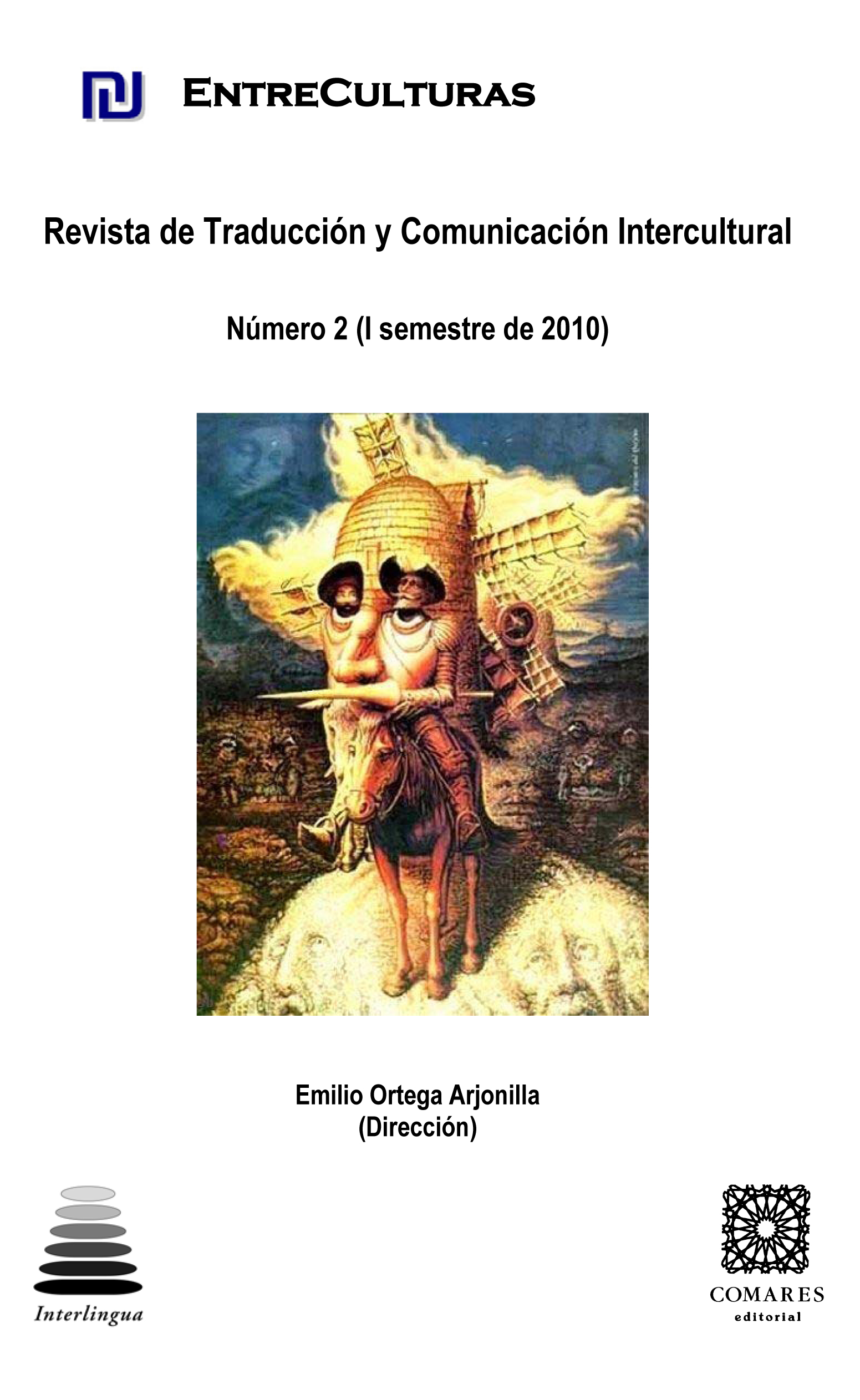DIS/PLACING TERRITORIES OF IDENTITY IN TRANSLATION
DOI:
https://doi.org/10.24310/Entreculturasertci.vi2.11755Palabras clave:
Traducción, identidad, desequilibrios lingu?ísticosResumen
En la traducción, los cambios se producen no sólo de forma cuantitativa y tangible sino de manera cualitativa e intangible también. Las diferencias lingüísticas y culturales que la traducción desarrolla en el proceso de reescritura significan, a menudo, un desplazamiento de identidades y la proyección de nuevas realidades. A medida que la traducción crea nuevos territorios de identidad, los primeros han de evolucionar a anfitriones de lenguas y culturas, dándose instancias de desequilibrio de poder. Este artículo se centra en cómo las traducciones introducen estos cambios y la manera en que reaccionan los territorios de identidad.
Descargas
Métricas
Citas
BACCHILEGA, C. y N. ARISTA. (2007): “The Arabian Nights in the Kuokoa, a Nineteenth-Century Hawaiian Newspaper: Reflections on the Politics of Translation” en Marzolph, U. (ed.): The Arabian Nights in Transnational Perspective. Detroit, MI, Wayne State University, 157-182.
BETHELL, C. et al. (2003): “Measuring and Interpreting Health Care Quality Across Culturally-Diverse Populations: A Focus on Consumer-Reported Indicators of Health Care Quality.” FACCT- Foundation for Accountability. http://www.markle.org/resources/facct/doclibFiles/documentFile_592.pdf
BHABHA, H. (1997 [1994]): The Location of Culture. Londres/Nueva York, Routledge.
DIAZ, J. (2007): The Brief Wondrous Life of Oscar Wao. New York, Riverhead Books. Trans. Obejas, A. (2008): La breve y maravillosa vida de Óscar Wao. Nueva York, Vintage Español.
FENTON, S. y P. MOON (2002): “The Translation of the Treaty of Waitangi: A Case of Disempowerment” en Tymoczko, M. and E. Gentzler (eds.): Translation and Power. Amherst/Boston, University of Massachusetts, 25-44.
GUPTA, P. (1998): “Post- or Neo-Colonial Translation? Linguistic Inequality and Translator’s Resistance”. Translation & Literature, 7.2, 170-193.
HATIM, B. e I. MASON. (2000): “Politeness in Screen Translating” en Venuti, L.(ed.): The Translation Studies Reader. Londres/Nueva York, Routledge, 430- 445.
HICKEY, L. (2000): “Politeness in Translation between English and Spanish.” Target, 12:2, 229-240.
HOFMANN, S. (2006): “The Importance of Culture in Cognitive and Behavioral Practice.” Cognitive and Behavioral Practice, 13:4, 243-245.
KENAN, L. (2002): “Translation as a Catalyst for Social Change in China” en Tymoczko, M. y E. Gentzler (eds.): Translation and Power. Amherst/Boston, University of Massachusetts, 160-183.
MACK, M. (2002): “A note on translation” en The Norton Anthology of World Literature. The Twentieth Century. Nueva York/Londres, W. W. Norton & Company, A1-A12.
MEIFANG, Z. y V. LEI. (2004): “The Post-Colonial Translation Movement in Macao.” (Abstract). IATIS. http://www.iatis.org
PÉREZ REVERTE, A. (1988): El maestro de esgrima. Madrid: Santillana. Trans. Jull Costa, M. (1998): The Fencing Master. Nueva York, Harcourt Books.
SILVA, N. (2004): Aloha Betrayed. Durham, N.C., Duke University.
SPIVAK, G. (2000): “The Politics of Translation” in Venuti, L. (ed.): The Translation Studies Reader. London/New York, Routledge, 397-416.
VENUTI, L. (2005): “Local Contingencies: Translation and National Identities” en Bermann, S. y M. Wood (eds.): Nation, Language, and the Ethics of Translation. Princeton/Oxford, Princeton University Press, 177-202.
? (1998): The Scandals of Translation. Towards an Ethics of Difference. Londres/Nueva York, Routledge.
YIFENG, S. (2008): “Opening the Cultural Mind: Translation and the Modern Chinese Literary Canon”. Modern Language Quarterly, 69:1, 13-27.
Descargas
Publicado
Cómo citar
Número
Sección
Licencia
Todos los contenidos publicados en Entreculturas. Revista de traducción y comunicación intercultural están sujetos a la licencia Creative Commons Reconocimento-NoComercia-Compartirigual 4.0 cuyo texto completo puede consultar en <http://creativecommons.org/licenses/by-nc-sa/4.0>
- Se pueden copiar, usar, difundir, transmitir y exponer públicamente, siempre que:
- Se cite la autoría y la fuente original de su publicación (revista, editorial y URL de la obra).
- No se usen para fines comerciales.
- Se mencione la existencia y especificaciones de esta licencia de uso.
Los derechos de autor son de dos clases: morales y patrimoniales. Los derechos morales son prerrogativas perpetuas, irrenunciables, intransferibles, inalienables, inembargables e imprescriptibles. De acuerdo con la legislación de derechos de autor, Entreculturas. Revista de traducción y comunicación intercultural reconoce y respeta el derecho moral de los autores/as, así como la titularidad del derecho patrimonial, el cual será cedido a la Universidad de Málaga para su difusión en acceso abierto. Los derechos patrimoniales, se refieren a los beneficios que se obtienen por el uso o divulgación de las obras. Entreculturas. Revista de traducción y comunicación se publica en open access y queda autorizada en exclusiva para realizar u autorizar por cualquier medio el uso, distribución, divulgación, reproducción, adaptación, traducción o transformación de la obra.
Es responsabilidad de los autores/as obtener los permisos necesarios de las imágenes que están sujetas a derechos de autor.





7.png)
